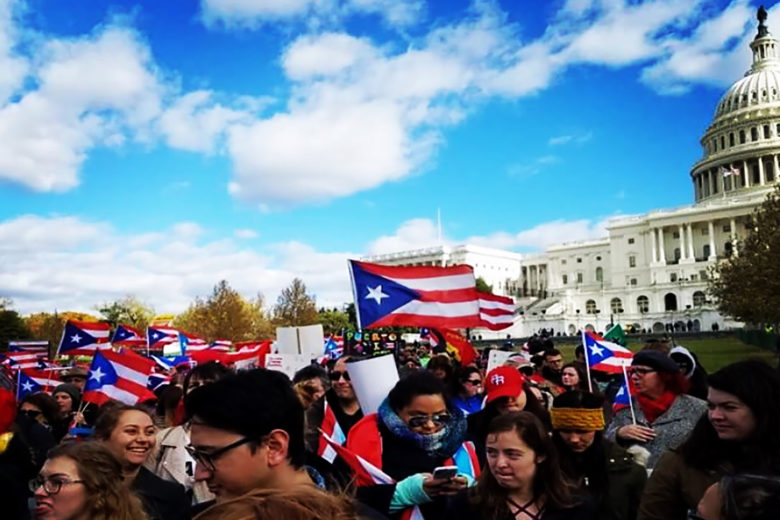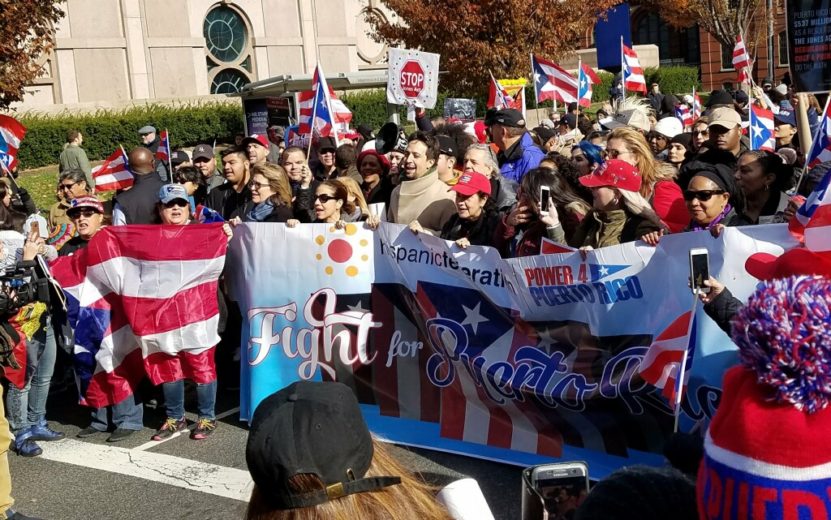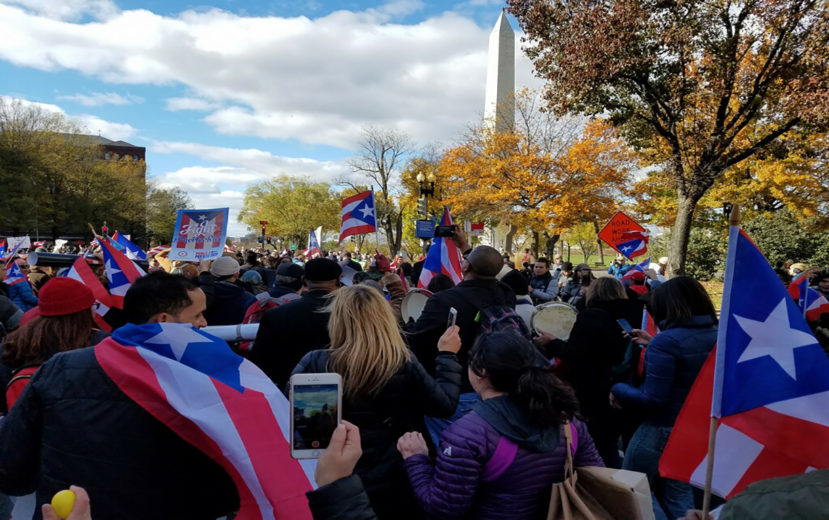
On November 19th, at 4:30 a.m. on a cold, rainy Sunday morning in New York I joined one of many busloads of citizens traveling to Washington D.C. to participate in the Unity March for Puerto Rico. The march was organized by a small group of activists led by Chair Evelyn Mejil and Co-Chair Ululy Rafael Martinez, with the support of organizations such as The Hispanic Federation, The National Puerto Rican Day Parade, the Puerto Rican Family Institute and La Unidad Latina Foundation.
Why A March?
The march was born out of frustration over relief efforts for Puerto Rico after Hurricane Maria devastated the island. Months later residents are still without electricity and running water. The Federal government has botched the response according to many critics from not sending aid and personnel quickly enough, to the insulting visit by the U.S. Commander in Chief who decided to throw paper towels at residents, while tweeting attacks at critics and saying that government support would be limited. Yet, the local government has also had its share of criticism: the under reporting of deaths in the wake of the storm to misuse of charitable donations and questionable rebuilding contracts that awarded millions to unproven businesses.
The [event] committee’s demand for the march were purposely simple to minimize the politics that often divides Puerto Rican activists. Among the demands were –a repeal of the Jones Act, forgiveness of the island’s $74 billion debt and a new Marshall Plan to rebuild Puerto Rico. Most participants present agreed with these main tenants, though some groups attending distributed other demands as well.
Who Showed Up?

A majority of the marchers were part of the Puerto Rican diaspora, people with Puerto Rican roots who live on the mainland United States. They came from the Northeastern states such as New York, New Jersey, Connecticut and Pennsylvania, but also as far away at Illinois, Florida and Ohio.
Marchers first gathered in front of the Capital Building, which was closed ahead of the Thanksgiving holiday. Yet, the lack of normal activity did not stop us from making our voices heard. There we were introduced to the organizers, and were moved by two children who expressed how difficult it was for their families in Puerto Rico post-Maria.
Despite the Congressional break, the march had some important representation supporting their cause including New York Congressman Joseph Crowley and Illinois Congressman Luis Gutierrez. Gutierrez, who flew in from Chicago just for this event gave a rousing speech in support of Puerto Rico, and criticizing his fellow Congress members for not doing enough to support relief efforts. A representative from Senator Bernie Sander’s office announced that after the break, Senator Sanders and others would be introducing a comprehensive bill for Puerto Rico relief. The Senator has come out in support of the island numerous times and opposed the PROMESA bill for its imposed austerity measures.
From the steps of the Capitol Building we proceeded to the Lincoln Memorial which was filled with music, color, and bright and wind-kissed faces chanting slogans against the Jones Act, the debt, and in support of the Puerto Rican people. Lin-Manuel Miranda, Broadway star and composer, who earlier had lent his support along with his father Luis Miranda, joined the march. Upon arrival at the Lincoln Memorial, Miranda and Puerto Rican icon Rita Moreno kicked off a second round of speeches and rally cries for the people assembled. Carmen Yulín Cruz, the mayor of San Juan, who couldn’t attend due to unforeseen difficulty at the airport, sent a video thanking supporters and organizers, expressing yet again how much work needs to be done.
For all the inspiring speeches heard on this day, the stand out was clearly the chair herself, Evelyn Mejil, who’s firebrand technique energized the crowd and brought home the reason why people were there. She expressed that it was “OK” to be angry, as long as that anger brought people to action. It was something she said she learned from Luis Miranda, the former chair of the Hispanic Federation.
The Diversity (of Opinion)
Yet, the march was not without controversy. Battling hashtags #PuertoRicoSeLevanta vs. #PuertoRicoDePie reflected the internal debate of how the event wanted to reflect its image of strength in the face of adversity. Some organizations, mostly left-wing groups favoring independence for Puerto Rico, did not support the march. Some felt the speakers should have been more critical of Puerto Rico Governor Rossello and his administration. Even the day was debated. November 19th is the day Christopher Columbus landed on the island of Puerto Rico and many recognize the day as Puerto Rico’s “discovery” day, celebrating the 524 anniversary this year. Some felt the date was ironic for a march in support of the island, though others felt it was an opportunity to take “back” the date for the Puerto Rican people.
Despite these differing perspectives, the march started, continued, and ended unified with a vibrant, peaceful, and festive atmosphere throughout.
What We Accomplished

The march was successful in bringing media attention to the continued struggles of the island and letting the residents of Puerto Rico know they have not been forgotten. The march was well timed, the agenda packed and the message clear to all listening. That thousands showed up despite the chilly November temperatures showed the passion that continues to drive the diaspora to help where we can. But as the speakers said, more people need to move away from their comfort zones and show support, and more can still be done.
The work now is to get Congress to act on the demands of removing the Jones Act, addressing the debt and reigniting relief efforts. The battle to save Puerto Rico has not concluded, in fact, it has just begun.
If you could not attend the Unity March for Puerto Rico, it’s not too late to provide support. For a list of reputable organizations you can donate to visit: How You Can Help Puerto Rico Now
